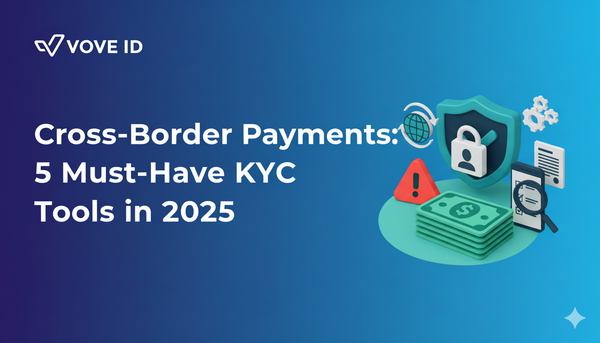5 KYC/KYB Solutions for Cross-Border Payment Companies

Cross-border payments fuel the global economy, powering digital wallets, fintech apps, and gig-economy platforms. However, stricter regulations, especially in Africa and the Middle East, demand robust Know Your Customer (KYC) and Know Your Business (KYB) compliance to meet AML/CFT standards. KYC for cross-border payments in Africa and MENA requires balancing speed, digital identity verification, local ID coverage, and seamless onboarding. Below, we review five leading solutions for KYB compliance for payment companies, starting with VOVE ID, a standout for digital onboarding in Africa and MENA.
VOVE ID: Regional Leader for KYC in Africa and MENA
VOVE ID is purpose-built for KYC for cross-border payments in Africa and MENA, addressing challenges like fragmented ID systems and unreliable internet. Its platform offers digital onboarding in Africa, eKYC, and KYB verification, with APIs that integrate seamlessly into web and mobile apps for payment platforms. Unlike global providers, VOVE ID supports local IDs, passports, and business registries in markets like Nigeria, Kenya, the UAE, Saudi Arabia, Kuwait, and Qatar, ensuring KYB compliance for payment companies under local AML/CFT regulations.
Its mobile-first approach is ideal for regions where smartphones dominate, such as Nigeria or Saudi Arabia. A user on X praised its efficiency: “Verifying people & businesses shouldn’t take days… or your sanity” (2025-09-29). Startups benefit from verification times under a minute and customizable risk controls, enabling rapid scaling across borders. While its global presence is growing, VOVE ID’s expertise in digital onboarding in Africa and MENA makes it a top pick for fintechs targeting these regions.
Uqudo: Mobile-First for Emerging Markets
Uqudo focuses on digital identity for KYC for cross-border payments in Africa and MENA, with traction in the Gulf and East Africa. Its platform includes biometric verification (facial recognition, liveness detection), document scanning, and integration with national ID systems like the UAE’s Emirates ID or Kenya’s Huduma Namba. Its mobile-first UX suits payment platforms in smartphone-driven markets. Users report onboarding in seconds, critical for high-volume cross-border flows (Capterra, 2025). However, coverage is weaker in less digitized markets like Ethiopia or Somalia, and pricing can strain early-stage startups. Uqudo is ideal for Gulf-based firms expanding into East Africa and needing government-backed identity checks for KYB compliance for payment companies.
Shufti Pro: Global Compliance Powerhouse
Shufti Pro is a global leader in KYC for cross-border payments, offering KYC, KYB, and AML screening across 240+ jurisdictions, with selfie/video verification and real-time sanctions/PEP checks. It’s a go-to for payment firms navigating international regulators in the EU, US, or APAC. Users praise its speed: “Easy and fast onboarding for our crypto platform” (G2, 2024). Its brand trust aids KYB compliance for payment companies in global markets.
However, false negatives are a concern, especially for non-standard IDs in Africa. A Trustpilot user noted, “Rejected due to potential fraud without clear reasons” (2023). Integration can also be “a bit tricky” for smaller teams (G2, 2024). Shufti Pro suits established firms prioritizing global compliance over regional agility.
Sumsub: Enterprise-Grade for High-Risk Verticals
Sumsub excels in high-risk sectors like crypto and trading, combining KYC for cross-border payments, KYB, AML, and transaction monitoring with robust audit trails. Its automation is a game-changer, with a Capterra user stating it “shaved off tons of work for our compliance team” (2025). Payment firms in regulated hubs like South Africa or Singapore benefit from its enterprise tools and API flexibility for KYB compliance for payment companies.
However, implementation can overwhelm smaller startups. Some users report UX issues: “Verification rejections without clear explanations, and support response can be slow” (Trustpilot, 2024). Another mentioned “endless verification loops” (G2, 2023). Sumsub is best for firms with resources to handle complex integrations and a need for regulatory rigor.
IDfy: Budget-Friendly for Asia-Focused Pilots
IDfy, rooted in Asia, expands into cross-border payments with affordable document verification, biometric checks, and risk profiling. Users in India and Southeast Asia praise its “smooth onboarding” and cost-effectiveness, with one noting it “reduced onboarding time by 80%” (G2, 2024). However, coverage for digital onboarding in Africa and MENA is limited, with Capterra users reporting “delays in reports for non-Asian IDs” (2024). IDfy suits budget-conscious startups piloting payments in specific corridors but struggles to scale in Africa or MENA compared to VOVE ID.
Conclusion: Why VOVE ID Leads for Africa and MENA
Cross-border payment firms need KYC/KYB solutions that adapt to fragmented regulations, support local IDs, and prioritize mobile-first onboarding without compromising compliance. Shufti Pro and Sumsub offer global reach, Uqudo and IDfy provide niche alternatives, but VOVE ID excels for KYC for cross-border payments in Africa and MENA. With its localized expertise, flexible integrations, and focus on regional challenges like mobile penetration and regulatory diversity, VOVE ID combines local expertise with scalable KYC/KYB solutions, making it the partner of choice for compliance and growth.
| Provider | Strengths | Weaknesses | Best For |
|---|---|---|---|
| VOVE ID | Local ID support, mobile-first, fast verification | Limited global reach | Africa/MENA fintechs |
| Uqudo | Biometric UX, government integration | Weak coverage in some African markets, pricing | Gulf/East Africa expansion |
| Shufti Pro | Global coverage, brand trust | False negatives, complex integration | Global compliance |
| Sumsub | Compliance rigor, automation | Heavy implementation, UX issues | High-risk verticals |
| IDfy | Affordable, quick deployment | Limited Africa/MENA coverage | Asia-focused startups |




